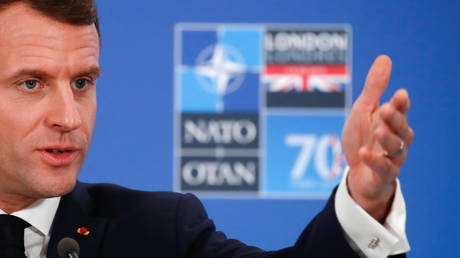
French PresIdent Emmanuel Macron has seemingly had a change of heart regarding NATO, the North Atlantic military alliance he dismissed as ‘brain-dead’ in 2019.
Macron insisted on Thursday that France sought to “revitalize” its alliance with NATO – still with a pointed call for reform, but a far cry from 2019’s complaints that the alliance was almost “brain-dead.” Macron told the Economist that year that “what we are currently experiencing is the brain death of NATO.”
Speaking to the press in Paris alongside NATO Secretary General Jens Stoltenberg, Macron said the alliance’s upcoming summit in June “must deliver a political clarification” on its role and “strategic priorities.”
“We want to revitalize the alliance and, for that, we need clarification, cohesion, and responsibility,” he said, adding that the bloc must be clear on the “values, principles and rules” that underpin it. The comment could be interpreted as a jab at Turkey, which the French president and other NATO leaders have criticized for taking unilateral military action without warning partner countries first.
The president’s earlier statements disparaging NATO came ahead of its 2019 summit and the internal bad feelings seem to have begun to dissipate since, suggesting any change of heart felt by the French leader might have been linked – at least in part – to the departure of polarizing US President Donald Trump.
Indeed, Macron alluded to Trump in the 2019 interview, arguing that it was time to “reassess the reality of what NATO is in the light of the commitment of the United States” and that it “only works if the guarantor of last resort functions as such.”
He shocked his fellow alliance members by suggesting he “didn’t know” whether he still believed in the effectiveness of another of the alliance’s founding principles, wondering aloud whether an attack against one member would still be met with collective defence. Washington is “turning its back on us,” Macron fretted to the magazine, insisting the US was showing signs of distancing itself from its European allies, such as making political moves before tipping off its allies.
While several international factors have changed since Macron made those controversial remarks – most notably Trump’s departure from the world stage and an upsurge in Islamic extremism in France – his 180-degree turn nevertheless may come as a surprise for some.
Support for NATO dipped significantly in France in 2020, with a Pew Research Center study finding 49% had positive opinions of the alliance, down from 60% in 2017.
While the young ex-banker Macron handily beat rising political scion Marine Le Pen during the last vote in 2017, a spate of Islamist terror attacks coupled with public distaste for how Macron handled the Covid-19 pandemic has pushed some of the voting population to the right.
As of late April, Macron’s support had plummeted to 37% from the 62% he had on being elected under the banner of La Republique En Marche, and the local elections held earlier this year hinted that he was due to receive a clubbing at the ballot box from both left and right.
Macron has been criticized for using the Covid-19 pandemic to seize more executive power. One profoundly unpopular measure would have seen it made illegal to film police in action – a move that sparked massive street protests last year, with critics saying it would make it impossible for journalists to do their jobs. France’s top constitutional court blocked the measure this week, saying it was too vague. However, Macron’s government has the option to make the law more specific, meaning some version of it could pass eventually.
Like this story? Share it with a friend!




